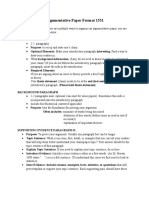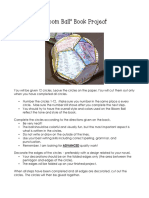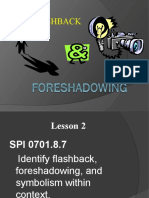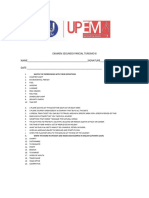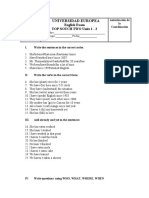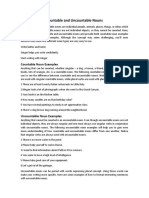Subject and Predicate
Subject and Predicate
Uploaded by
Licenciada Sonia Angélica Alfaro CruzCopyright:
Available Formats
Subject and Predicate
Subject and Predicate
Uploaded by
Licenciada Sonia Angélica Alfaro CruzOriginal Description:
Copyright
Available Formats
Share this document
Did you find this document useful?
Is this content inappropriate?
Copyright:
Available Formats
Subject and Predicate
Subject and Predicate
Uploaded by
Licenciada Sonia Angélica Alfaro CruzCopyright:
Available Formats
Subject and Predicate
Every complete sentence contains two parts: a subject and apredicate. The subject is what (or whom) the sentence is about, while the
predicate tells something about the subject. In the following sentences, the predicate is enclosed in braces ({}), while the subject
is highlighted.
Judy {runs}.
Judy and her dog {run on the beach every morning}.
To determine the subject of a sentence, first isolate the verb and then make a question by placing "who?" or "what?" before it -- the answer is
the subject.
The audience littered the theatre floor with torn wrappings and spilled popcorn.
The verb in the above sentence is "littered." Who or what littered? The audience did. "The audience" is the subject of the sentence. The predicate
(which always includes the verb) goes on to relate something about the subject: what about the audience? It "littered the theatre floor with torn
wrappings and spilled popcorn."
Unusual Sentences
Imperative sentences (sentences that give a command or an order) differ from conventional sentences in that their subject, which is always
"you," is understood rather than expressed.
Stand on your head. ("You" is understood before "stand.")
Be careful with sentences that begin with "there" plus a form of the verb "to be." In such sentences, "there" is not the subject; it merely signals
that the true subject will soon follow.
There were three stray kittens cowering under our porch steps this morning.
If you ask who? or what? before the verb ("were cowering"), the answer is "three stray kittens," the correct subject.
Simple Subject and Simple Predicate
Every subject is built around one noun or pronoun (or more) that, when stripped of all the words that modify it, is known as the simple subject.
Consider the following example:
A piece of pepperoni pizza would satisfy his hunger.
The subject is built around the noun "piece," with the other words of the subject -- "a" and "of pepperoni pizza" -- modifying the noun. "Piece" is
the simple subject.
Likewise, a predicate has at its centre a simple predicate, which is always the verb or verbs that link up with the subject. In the example we
just considered, the simple predicate is "would satisfy" -- in other words, the verb of the sentence.
A sentence may have a compound subject -- a simple subject consisting of more than one noun or pronoun -- as in these examples:
Team pennants, rock posters and family photographs covered the boy's bedroom walls.
Her uncle and she walked slowly through the Inuit art gallery and admired the powerful sculptures exhibited there.
The second sentence above features a compound predicate, a predicate that includes more than one verb pertaining to the same subject (in
this case, "walked" and "admired").
Written by Frances Peck
You might also like
- Argumentative Paper Format 1Document3 pagesArgumentative Paper Format 1EddyOmburahNo ratings yet
- Manasi Patil - My Life As A Bat Text-With Embedded Annotations Questions HouseDocument4 pagesManasi Patil - My Life As A Bat Text-With Embedded Annotations Questions Houseapi-361270467100% (2)
- Word OrderDocument15 pagesWord OrderIndah EftanastariniNo ratings yet
- MLA 9th Edition PresentationDocument17 pagesMLA 9th Edition Presentationer9rughNo ratings yet
- Context Clues & PracticeDocument44 pagesContext Clues & PracticeayaNo ratings yet
- Final Study Guide (Freshman English)Document4 pagesFinal Study Guide (Freshman English)kory_muscatoNo ratings yet
- Free-Verse PoetryDocument23 pagesFree-Verse PoetryJade BaliolaNo ratings yet
- La - Literature - Literary Devices 2Document5 pagesLa - Literature - Literary Devices 2api-238179390No ratings yet
- Grammar Notes Spoken English, Let's Enjoy Learning EnglishDocument21 pagesGrammar Notes Spoken English, Let's Enjoy Learning Englishwww.efrenmaria010600No ratings yet
- Word Parts GuideDocument6 pagesWord Parts GuideRya EarlNo ratings yet
- Part Four: Constructing Conclusion Paragraphs (2-6 Sentences)Document1 pagePart Four: Constructing Conclusion Paragraphs (2-6 Sentences)Jennifer CoatNo ratings yet
- The Perfect ParagraphDocument14 pagesThe Perfect ParagraphMichelleNo ratings yet
- Activity 2 For Compare and ContrastDocument7 pagesActivity 2 For Compare and ContrastOsman Abdi KulaneNo ratings yet
- La - Literature - The Time Machine - Chapter 6Document6 pagesLa - Literature - The Time Machine - Chapter 6api-238179390No ratings yet
- Kasthuri Thamaiyanthi MythiliDocument12 pagesKasthuri Thamaiyanthi MythiliThämäíyänthí RätnämNo ratings yet
- Pronoun-Antecedent Agreement: Rustum A. Pastor Jr. JD IiDocument35 pagesPronoun-Antecedent Agreement: Rustum A. Pastor Jr. JD IiAdriel Earl ToribioNo ratings yet
- The Lady, or The TigerDocument8 pagesThe Lady, or The TigerDaniel FrazónNo ratings yet
- Biography of DickensDocument23 pagesBiography of DickensFaisal JahangeerNo ratings yet
- The Passionate Shepherd To His Love: Christopher MarloweDocument17 pagesThe Passionate Shepherd To His Love: Christopher MarloweNikka Jean Duero LachicaNo ratings yet
- Douglass Fourth of JulyDocument18 pagesDouglass Fourth of Julyapi-343851988100% (1)
- Expository Essay Outline FormDocument2 pagesExpository Essay Outline FormMohammad ZamanNo ratings yet
- Poetry Definition of TermsDocument2 pagesPoetry Definition of TermsLeviNo ratings yet
- GREATBOOKSDocument6 pagesGREATBOOKSJan Rey ValeraNo ratings yet
- WorksheetsDocument10 pagesWorksheetsjulie_emman01100% (1)
- Narrative Tenses: Gloria Esperanza García Medina 602017 EnglishDocument9 pagesNarrative Tenses: Gloria Esperanza García Medina 602017 EnglishMauricio MendozaNo ratings yet
- The Perfect Paragraph: Mr. Wence-Munoz ELL 3 & 4 North Chicago Community High SchoolDocument7 pagesThe Perfect Paragraph: Mr. Wence-Munoz ELL 3 & 4 North Chicago Community High SchoolgerawenceNo ratings yet
- American Literature Study GuideDocument22 pagesAmerican Literature Study Guidehoanghuy2094No ratings yet
- Terms For Rhetorical AnalysisDocument3 pagesTerms For Rhetorical Analysisapi-359302008No ratings yet
- 1984 Calendar Unit PlanDocument6 pages1984 Calendar Unit Planapi-200442480No ratings yet
- PhrasesDocument80 pagesPhrasesDebuton ChesterNo ratings yet
- The World On Turtle's BackDocument5 pagesThe World On Turtle's Backmikejmoran50% (2)
- Academic Writing ChecklistDocument2 pagesAcademic Writing ChecklistAndrea BigoniNo ratings yet
- La - Literature - The Time Machine - Chapter 5Document6 pagesLa - Literature - The Time Machine - Chapter 5api-238179390No ratings yet
- Langston Hughes WorksheetsDocument10 pagesLangston Hughes WorksheetsColtonNo ratings yet
- How To Write A Hook GuidelinesDocument5 pagesHow To Write A Hook GuidelinesmuslemanirachaNo ratings yet
- Language PromptsDocument6 pagesLanguage PromptsAnonymous itgH9LOTNo ratings yet
- Domain 1: Planning & Preparation: ED 345 Calvin College Teacher Intern Lesson Plan TemplateDocument3 pagesDomain 1: Planning & Preparation: ED 345 Calvin College Teacher Intern Lesson Plan Templateapi-384800531No ratings yet
- Identifying Main Ideas and Details 2021Document16 pagesIdentifying Main Ideas and Details 2021juanitak2711No ratings yet
- Necklace QuestionsDocument2 pagesNecklace QuestionsMatiuillah AhmadiNo ratings yet
- Oranges 2 PDFDocument2 pagesOranges 2 PDFSheni OgunmolaNo ratings yet
- Ender's Game L1 RobertDocument20 pagesEnder's Game L1 RobertRobert Schneider100% (1)
- English 102 Close Reading ExerciseDocument2 pagesEnglish 102 Close Reading Exerciseapi-97217755No ratings yet
- Transition Words/Phrases For Narrative WritingDocument1 pageTransition Words/Phrases For Narrative WritingecolaundrymlgNo ratings yet
- Deason - Bloom - Ball - Project - Making Reading Meaningful PDFDocument2 pagesDeason - Bloom - Ball - Project - Making Reading Meaningful PDFSuresh DassNo ratings yet
- Lesson 1 Context Clues Power PointDocument44 pagesLesson 1 Context Clues Power Pointpayyongg100% (1)
- Narrative HookDocument4 pagesNarrative Hookapi-262506169No ratings yet
- Foreshadowing FlashbackDocument37 pagesForeshadowing Flashbackmarybeth0240100% (1)
- Julius Caesar Introduction, Character PredictionsDocument15 pagesJulius Caesar Introduction, Character Predictionsmarinel01No ratings yet
- Lecture ModifiersDocument29 pagesLecture ModifiersKaleem SattiNo ratings yet
- Theories of LiteratureDocument19 pagesTheories of LiteratureIsti Qomariah100% (1)
- l2 Analyzing A NovelDocument2 pagesl2 Analyzing A Novelapi-258903855No ratings yet
- Where The Red Fern Grows Book ReportDocument2 pagesWhere The Red Fern Grows Book Reportapi-239501898No ratings yet
- Dangling and Misplaced ModifiersDocument16 pagesDangling and Misplaced ModifiersArlissa Liz ArceoNo ratings yet
- Poetry Anthology 2013Document2 pagesPoetry Anthology 2013Danika BarkerNo ratings yet
- GerundsDocument13 pagesGerundsscpsdiNo ratings yet
- Figurative Language Lesson 2Document41 pagesFigurative Language Lesson 2Miaka LeeNo ratings yet
- Interpreting Literature: Approaching The Text Analyzing The TextDocument19 pagesInterpreting Literature: Approaching The Text Analyzing The TextLeo Andrew OlarteNo ratings yet
- Lady and The Tiger Hand OutDocument2 pagesLady and The Tiger Hand OutchristinahyltonNo ratings yet
- No Mistakes Grammar Bites Volume XIV, "Superlatives and How We Use them Wrong"From EverandNo Mistakes Grammar Bites Volume XIV, "Superlatives and How We Use them Wrong"No ratings yet
- Universidad Europea: Breakthrough Intro UNITS 1-2Document3 pagesUniversidad Europea: Breakthrough Intro UNITS 1-2Licenciada Sonia Angélica Alfaro CruzNo ratings yet
- Examen Segundo Parcial Turismo 8 Ingles Especializado 1Document1 pageExamen Segundo Parcial Turismo 8 Ingles Especializado 1Licenciada Sonia Angélica Alfaro CruzNo ratings yet
- WL4e L4 StudentWorksheets ReviewPages Unit05Document3 pagesWL4e L4 StudentWorksheets ReviewPages Unit05Licenciada Sonia Angélica Alfaro CruzNo ratings yet
- Guia de Estudio Top Notch 3 Units 6-7Document4 pagesGuia de Estudio Top Notch 3 Units 6-7Licenciada Sonia Angélica Alfaro Cruz100% (1)
- Was Were PeopleDocument1 pageWas Were PeopleLicenciada Sonia Angélica Alfaro CruzNo ratings yet
- Guia de Estudio Breaktrough Units 6 - 9 Second PartialDocument5 pagesGuia de Estudio Breaktrough Units 6 - 9 Second PartialLicenciada Sonia Angélica Alfaro CruzNo ratings yet
- Gastronomia 2b-Primer ParcialDocument2 pagesGastronomia 2b-Primer ParcialLicenciada Sonia Angélica Alfaro CruzNo ratings yet
- Guia de Estudio Top Notch 2 Units 8Document6 pagesGuia de Estudio Top Notch 2 Units 8Licenciada Sonia Angélica Alfaro CruzNo ratings yet
- Breakthrough Intro - 3-4Document3 pagesBreakthrough Intro - 3-4Licenciada Sonia Angélica Alfaro CruzNo ratings yet
- Guia de Estudio Top Notch 2 1-2Document3 pagesGuia de Estudio Top Notch 2 1-2Licenciada Sonia Angélica Alfaro CruzNo ratings yet
- Top Notch 2 Units 7. 8Document3 pagesTop Notch 2 Units 7. 8Licenciada Sonia Angélica Alfaro CruzNo ratings yet
- Universidad Europea: English Exam Top Notch Two Units 7-10 Final TestDocument2 pagesUniversidad Europea: English Exam Top Notch Two Units 7-10 Final TestLicenciada Sonia Angélica Alfaro Cruz100% (1)
- Top Notch 2 Final Test 1-6Document3 pagesTop Notch 2 Final Test 1-6Licenciada Sonia Angélica Alfaro Cruz100% (2)
- Top Notch 2 Units 1-2 February 2012Document3 pagesTop Notch 2 Units 1-2 February 2012Licenciada Sonia Angélica Alfaro CruzNo ratings yet
- Top Notch 2 Units 3-4 March 2012Document5 pagesTop Notch 2 Units 3-4 March 2012Licenciada Sonia Angélica Alfaro CruzNo ratings yet
- Clauses and Phrases: To Understand Punctuation, It Is Helpful To Understand The Difference Between A Phrase and A ClauseDocument2 pagesClauses and Phrases: To Understand Punctuation, It Is Helpful To Understand The Difference Between A Phrase and A ClauseLicenciada Sonia Angélica Alfaro CruzNo ratings yet
- FINALESSAYANGIEDocument3 pagesFINALESSAYANGIELicenciada Sonia Angélica Alfaro CruzNo ratings yet
- The Basic Parts of A ParagraphDocument2 pagesThe Basic Parts of A ParagraphLicenciada Sonia Angélica Alfaro CruzNo ratings yet
- Skyline 4, Units 7-12 Abril 2010Document2 pagesSkyline 4, Units 7-12 Abril 2010Licenciada Sonia Angélica Alfaro CruzNo ratings yet
- English 9 First PartialDocument3 pagesEnglish 9 First PartialLicenciada Sonia Angélica Alfaro CruzNo ratings yet
- Universidad Europea: Skyline 4 Final TestDocument3 pagesUniversidad Europea: Skyline 4 Final TestLicenciada Sonia Angélica Alfaro CruzNo ratings yet
- 13 The Poetical Stela of Thutmose III: (Cairo Museum 34010) IDocument16 pages13 The Poetical Stela of Thutmose III: (Cairo Museum 34010) IAngelika ErhardtNo ratings yet
- Recopilado para Gramatica Del Inglés PDFDocument90 pagesRecopilado para Gramatica Del Inglés PDFcompubro8No ratings yet
- Possessive Adjectives and PronounsDocument5 pagesPossessive Adjectives and PronounsCristell Ximena Cardona RomeroNo ratings yet
- 8 Partsof Speech Grammar Practice TestDocument8 pages8 Partsof Speech Grammar Practice TestMuhammad Ahsan iftikharNo ratings yet
- Prepositional Phrases PDFDocument15 pagesPrepositional Phrases PDFwatankhanNo ratings yet
- Passive Voice ChartDocument1 pagePassive Voice ChartK Sofía RoncalloNo ratings yet
- MBA English Lec 1 (N)Document23 pagesMBA English Lec 1 (N)Usa 2021No ratings yet
- Arabic Manual Levantine F E CrowDocument368 pagesArabic Manual Levantine F E CrowKevin Mogg100% (1)
- Assignment 4 Topic 4 Parts of Speech NewDocument2 pagesAssignment 4 Topic 4 Parts of Speech Newayu nilawatiNo ratings yet
- Zein Tahwiana Reviewed Shakina's PaperDocument21 pagesZein Tahwiana Reviewed Shakina's PapersakinaNo ratings yet
- 数据集 3Document215 pages数据集 3H ZhNo ratings yet
- Countable and Uncountable NounsDocument3 pagesCountable and Uncountable NounsEdison Pareja EscalanteNo ratings yet
- Access Grammar 2Document20 pagesAccess Grammar 2Agostina Calienno PazNo ratings yet
- Using The Passive VoiceDocument3 pagesUsing The Passive VoiceYolanda VilchezNo ratings yet
- Degree of PredicateDocument18 pagesDegree of PredicateFranciska Xaveria100% (1)
- PronounsDocument4 pagesPronounsMecislavs GrigorcuksNo ratings yet
- Lat 1A Latin, Level I, First Semester: Please Contact Your Proctor For The Correct Device NeededDocument15 pagesLat 1A Latin, Level I, First Semester: Please Contact Your Proctor For The Correct Device NeededDunjaNo ratings yet
- Determiner and Pronouns NotesDocument8 pagesDeterminer and Pronouns NotesVanessa ValerosoNo ratings yet
- Etymological DoubletsDocument4 pagesEtymological DoubletsAndreianu LoricaNo ratings yet
- Unit 3 Study Guide Spanish 1Document2 pagesUnit 3 Study Guide Spanish 1Alvin Young JrNo ratings yet
- Cautious LanguageDocument6 pagesCautious LanguageSamuel BularinNo ratings yet
- Cennamo 2022 Anticausativization OffprintDocument36 pagesCennamo 2022 Anticausativization OffprintMichela CennamoNo ratings yet
- Adjectives in A SeriesDocument7 pagesAdjectives in A SeriesBernardita GutibNo ratings yet
- Arabic Numbers, Cardinal and OrdinalDocument2 pagesArabic Numbers, Cardinal and Ordinalcolorado wilderness100% (2)
- 7-Ci Sinif Ingilis Dili ProgramıDocument6 pages7-Ci Sinif Ingilis Dili ProgramıfatimaNo ratings yet
- 2016 - Cuadernillo de Temas Gramaticales para Ingles 1 PDFDocument62 pages2016 - Cuadernillo de Temas Gramaticales para Ingles 1 PDFSol AlbiNo ratings yet
- Use of Lesson 5: Workbook (Part 1) : All The Contents in Are Protected Under ADocument33 pagesUse of Lesson 5: Workbook (Part 1) : All The Contents in Are Protected Under AsmhilezNo ratings yet
- Noun SuffixesDocument94 pagesNoun SuffixesEdz SoretsellaBNo ratings yet
- Exercise 1: A) .Llene Los Espacios Con La Forma Del Verbo en Presente: Am-Is-AreDocument6 pagesExercise 1: A) .Llene Los Espacios Con La Forma Del Verbo en Presente: Am-Is-AreDianaNo ratings yet
- Grammar Guide 1 PDFDocument62 pagesGrammar Guide 1 PDFkeithgaymerNo ratings yet
